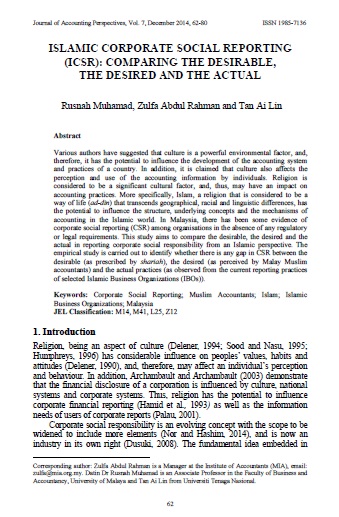Islamic Corporate Social Reporting (ICSR): Comparing the Desirable, the Desired and the Actual
Main Article Content
Abstract
Various authors have suggested that culture is a powerful environmental factor, and, therefore, it has the potential to influence the development of the accounting system and practices of a country. In addition, it is claimed that culture also affects the perception and use of the accounting information by individuals. Religion is considered to be a significant cultural factor, and, thus, may have an impact on accounting practices. More specifically, Islam, a religion that is considered to be a way of life (ad-din) that transcends geographical, racial and linguistic differences, has the potential to influence the structure, underlying concepts and the mechanisms of accounting in the Islamic world. In Malaysia, there has been some evidence of corporate social reporting (CSR) among organisations in the absence of any regulatory or legal requirements. This study aims to compare the desirable, the desired and the actual in reporting corporate social responsibility from an Islamic perspective. The empirical study is carried out to identify whether there is any gap in CSR between the desirable (as prescribed by shariah), the desired (as perceived by Malay Muslim accountants) and the actual practices (as observed from the current reporting practices of selected Islamic Business Organizations (IBOs)).
Downloads
Article Details
License
The Asian Journal of Accounting Perspectives (AJAP) articles are published under a licence equivalent to the Creative Commons Attribution-NonCommercial-NoDerivs License (CC BY-NC-ND). The licence allows users to copy, distribute, and transmit an article as long as the author is attributed. The article is not used for commercial purposes. The work is not modified or adapted in any way.
Copyright
Authors are required to sign the Exclusive License to Publish agreement upon publication in the AJAP. The agreement grants the Publisher (Faculty of Business and Accountancy, Universiti Malaya) to publish and disseminate the articles.
Open Access
Articles published in the AJAP are digital, online, free of charge, and free of most copyright and licensing restrictions.
Article Processing Charge
Articles publish in AJAP is free submission, production and publication charges. However, all accepted articles are required for language editing. The AJAP officially appointed and outsourced proofreader will conduct this process, and the authors will cover the cost. AJAP does not profit from this process and transaction.
